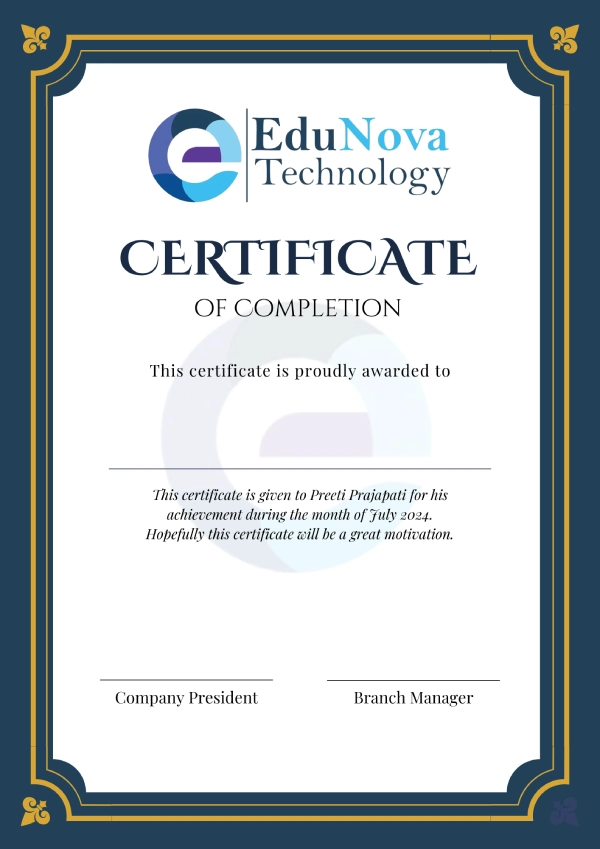- History and evolution of Java
Features of Java (e.g., platform independence, OOP, security)
JDK, JRE, and JVM
Setting up the development environment
Mobile Application Development
Android Development
Have you ever thought of creating your own Mobile Application?
Based on 99 Reviews
- Duration : 1 Month / 3 Months / 6 Months
- Language: English
- Certificate of Completion

An Android Development Course is a specialized program that teaches individuals how to create mobile applications for Android devices. This course covers fundamental concepts, including Java or Kotlin programming, Android Studio, and the Android SDK. Participants learn to design user-friendly interfaces, implement core functionalities, and integrate APIs to build robust and dynamic apps. Topics such as database handling, cloud integration, and app deployment on the Google Play Store are also explored. With hands-on projects and real-world examples, this course equips learners with the skills needed to launch a successful career in Android development or create custom apps for various needs.
- Writing and running your first Java program
Syntax, structure, and coding conventions
Data types, variables, and constants
Keywords and identifiers
- Conditional statements (if, else, switch)
Looping constructs (for, while, do-while)
Enhanced for loop
Jump statements (break, continue, return)
- Creating and using arrays (single and multidimensional)
Common array operations
Working with the String class and its methods
StringBuilder and StringBuffer
- Defining and Calling Methods
Method Overloading
Static vs. Instance Methods
Pass by Value
Variable Scope
Recursion
- Classes and objects
Constructors and initialization
this and super keywords
Inheritance (single, multilevel, hierarchical)
Polymorphism (method overloading and overriding)
Encapsulation and abstraction
Access modifiers (public, private, protected, default)
- Types of exceptions
Using try, catch, and finally blocks
Throwing and catching exceptions with throw and throws
Creating custom exceptions
- Introduction to threads and multitasking
Creating threads using Thread class and Runnable interface
Thread life cycle
Synchronization and inter-thread communication
- Introduction to collections
Interfaces: List, Set, Queue, Map
Classes: ArrayList, LinkedList, HashSet, TreeSet, HashMap, TreeMap
Iterating through collections using iterators
- Introduction to JDBC
Setting up the database and driver
Establishing a connection to the database
Performing CRUD operations with SQL
Handling database exceptions
- Introduction to the java.util.regex package
Pattern and Matcher classes
Common regex patterns
Finding, replacing, and validating strings
- Overview of Android Architecture and Components
Setting Up Android Development Environment (Android Studio)
Android SDK, AVD (Android Virtual Device) Setup
Introduction to Gradle for Project Management
- Understanding Layouts: LinearLayout, RelativeLayout, ConstraintLayout
TextView, Button, EditText, ImageView, and other UI Widgets
Handling User Input: Button Click, EditText, RadioButtons, CheckBoxes
Android Views and ViewGroups
Layout Resources and Dimen Resources
Introduction to Material Design and Custom Views
- Understanding Activity Lifecycle: onCreate, onStart, onResume, onPause, onStop, onDestroy
Creating Activities and Navigating Between Screens
Implicit and Explicit Intents
Passing Data Between Activities using Bundles
- ListViews and RecyclerViews
Adapters: ArrayAdapter, BaseAdapter, RecyclerView.Adapter
ViewPager, Tabs, and Fragments
Custom Views and Layouts
- OnClickListener, OnTouchListener, OnLongClickListener
Handling User Input from Text Fields, Buttons, and Radio Groups
Gesture Detection: Tap, Swipe, Pinch, etc.
Event Handling in Fragments
- nternal and External Storage
SharedPreferences: Storing simple key-value data
SQLite Database in Android: Creating, Reading, Updating, and Deleting Records
Content Providers and Data Sharing Between Apps
- Introduction to Networking in Android
Making HTTP Requests with HttpURLConnection and OkHttp
Parsing JSON Data with Gson and JSONParser
Working with RESTful APIs
Using Retrofit for Networking and API Integration
- Understanding Android Permissions System
Requesting Runtime Permissions
Handling Permissions for Camera, Location, and Storage
Securing Android Apps: Best Practices for Data Encryption and API Authentication
- Understanding Android Services: Background Processes and Services
Types of Services: Started Service and Bound Service
Creating and Binding Services
Broadcast Receivers: Sending and Receiving Broadcast Intents
- Working with Notifications: Basic and Custom Notifications
Notification Channels for Android 8.0 (Oreo) and Above
Notification Manager and PendingIntent
- Introduction to MVVM, MVC, and MVP Design Patterns
LiveData, ViewModel, and DataBinding
Room Database for Local Storage
ViewModel and LiveData for Managing UI-related Data
- Introduction to Firebase Services: Authentication, Firestore, Firebase Realtime Database
Firebase Authentication: Google Sign-In, Facebook Sign-In, Email/Password Sign-In
Using Firebase Cloud Messaging for Push Notifications
Firebase Analytics for App Tracking
- Preparing Android Apps for Production: Proguard and Obfuscation
Generating Signed APK for Publishing
Uploading to Google Play Store: App Bundle, Screenshots, App Description
- Project 1: Simple Android App (Calculator, Note-Taking, or Weather App)
Project 2: Task Management App (To-Do List or Task Tracker)
Project 3: Chat Application (Using Firebase or Socket Programming)
Project 4: Movie/TV Show Tracker App
Project 5: E-commerce App
This Course Include
- Language: English
- Duration : 1 Month / 3 Months / 6 Months
- Learning Mode: At Center ( Only Offline Classes )
- Jurisdiction: Nationwide
- Certificate of Completion
Eligibility Criteria
- Learner should preferably a std. 10th Pass student (Not Compulsory)
- It is desirable that Learner should have done MS-CIT Course (Not Compulsory)
Premium Course
Register For This Course
About Ms. Anjali Arora
Enroll in EduNova’s Flutter App Development Course and master the art of building stunning, high-performance mobile apps for both iOS and Android. Our expert instructors will walk you through each step of the development process, from installation and setup to debugging and deployment. You’ll gain essential programming skills, including Dart fundamentals, such as `const`, `static`, and `final` keywords, as well as Object-Oriented Programming (OOP) in Dart.
Based on 99 Reviews
Ready to take your team to the next level?
Contact us today to learn more about our Corporate Training programs and discover how we can help your organization thrive.


- IITM Pravartak certified Python certification.
- Certificates are globally recognized & they upgrade your programming profile.
- Certificates are generated after the completion of course.














Students/ Job Seekers

Business
Owners

Influencers/ Youtubers

Work as Freelancers

Working Professionals

Women / Housewives
They are unique because of their unique approach i.e; Placement, training then Hike. Firstly, they get students placed then give 8 Months of training in any Certification of your choice and at least a 70% hike after 10 months.
Click on Side menu- Choose Courses- Select the course you want to see- Course Detail page will open- click on Start Learning on top- now you can Enrol for the course.
Yes. We offer certifications upon course completion.
Python
Data science
Artificial Intelligence
Digital marketing
Cyber Security
Data Analytics
Quantum computing/ Cloud computing
Android App development
Web development


